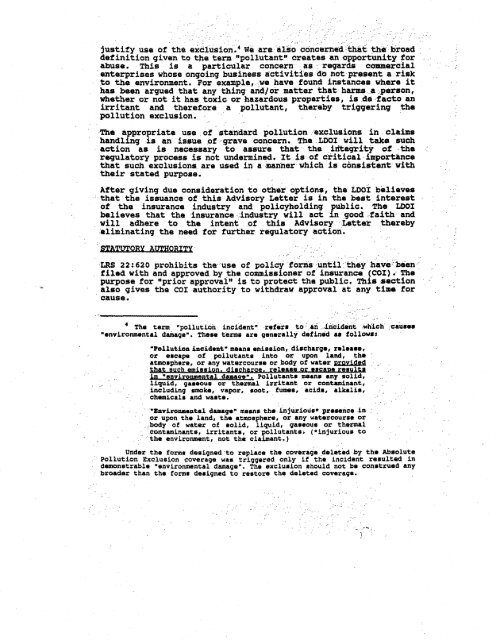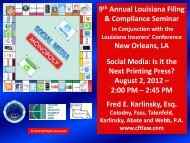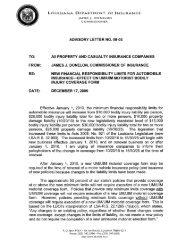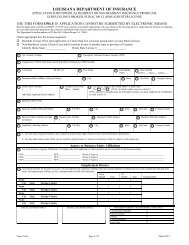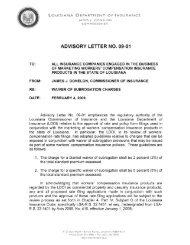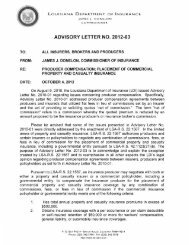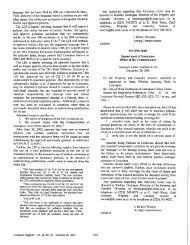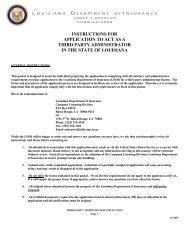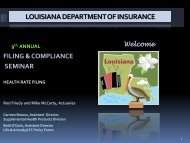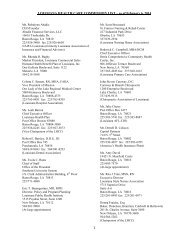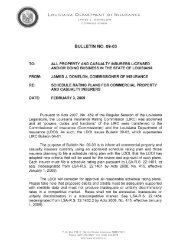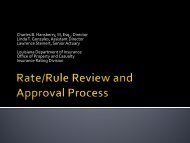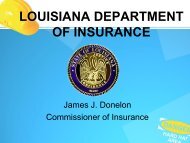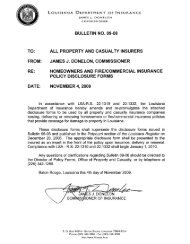Advisory Letter 97-01 - Use of Standard Pollution Exclusions
Advisory Letter 97-01 - Use of Standard Pollution Exclusions
Advisory Letter 97-01 - Use of Standard Pollution Exclusions
- No tags were found...
You also want an ePaper? Increase the reach of your titles
YUMPU automatically turns print PDFs into web optimized ePapers that Google loves.
justify use <strong>of</strong> 'the exdlusiol'i. 4 We areli1S~' c~n~~rne(i:that th.:broaddefinition qiven to the term "pollutant" ereates an opportUnity for,abuse. This is a particular concern, as • reqards commercialenterprises whose ongoing business ~ctivities do not'present a risk:to the environment. For example, "we have found instances where ithas been argued that any thing and/or matter that harms,a.,person,whether or not it has toxic or hazardous properties, is ,de ,facto anirritant and therefore a pollutant, thereby triqqerinq thepollution exclusion.The appropriate use, <strong>of</strong> 'standard pollution ,exclusions in ,claimshandling is an issue ,<strong>of</strong> 'grave con~ern. TheLDOI will take suchaction as is necessary to assure that', the ,irfteqrity <strong>of</strong> d theregulatory process is not undermined. It lso£ critical' importancethat such exclusions, are used in a ,manner which is consistant'withtheir stated purpose.After qivinq due consideration to other options, the tool believes, that the issuance <strong>of</strong> this <strong>Advisory</strong> <strong>Letter</strong> is in the best interest<strong>of</strong> the insurance industry and policyholdinq pUblic. The LDOIbelieves that the 'insurance ,industry will act ,in good "faith andwill adhere to the intent ,<strong>of</strong> this <strong>Advisory</strong> tetter therebyeliminatinq the'need for further regulatory action.STATUTORY AUTHORITYLRS 22:620 prohibits the'use <strong>of</strong> policyfornls :until:th.yhave:'b*enfiled with and approved by the cOlllmissioner <strong>of</strong> insurance (COl). Thepurpose for "prior approvai tl is to protect the public. This :sect'10n,also qives the cor authority to withdraw approval at any time forcause.4 The term "polluti'cn incident"r~f.ra' to:,an ,~.i.ncid.ri~ :which ;cau.e."environmental damage". Th.se terms are qenerally defined aa folloW8S"<strong>Pollution</strong> incident" means emission, di.char;., ral••••,or escape <strong>of</strong> pollutants into or upon land, theatmosphere, or any watercourse or body <strong>of</strong> water proddedtha~ !lush emi,8Iion. di,charge. reiease or "cap. r"ultlin "enyironmental c1yaU", pollutanu means any solid,liquid, gaseouB or thermal irritant or contaminant,:including smoke, vapor, soot" fumes,' acids, alkal!.s,chemicala and waste.'"hviroJ1lllllDtal dUB"e" means the injUrious. pres.nce ,inor upon the land, the atmosphere, or any wate~cours. ord)body <strong>of</strong> water <strong>of</strong> solid, liquid, 9aseous or thermal",contaminants, irritants, or pollutant•• (*injuriouB tothe envi.ronment, not the claimant.)Under the forme deBlgned'to repl~c. the coverage ,deleted by tha Ab.olute<strong>Pollution</strong> Exclusion coverage was triggered only if the incident resulted indemonstrable "environmental damage". The exclusion should not be construed anybroader than the forme desiqned to restore the deleted coverage.


